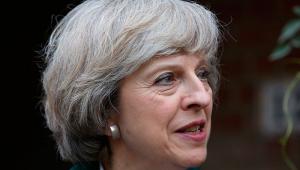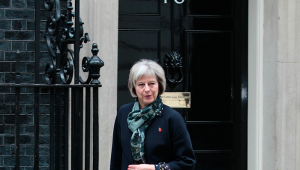In her speech to the party’s annual conference in Birmingham, the prime minister set out how government can help create a country that works for everyone.
May promised to spur the government to take action on areas such as improving social mobility, stating that government is about “identifying injustices, finding solutions, driving change”.
May said: “It’s time to remember the good that government can do. Time for a new approach that says while government does not have all the answers, government can and should be a force for good; that the state exists to provide what individual people, communities and markets cannot; and that we should employ the power of government for the good of the people.”
The prime minister told delegates that the country was on a path toward a new centre ground of British politics – built on the values of fairness and opportunity, where everyone plays by the same rules.
She added that the Labour party has given up the right to call themselves the party of the NHS, the party of the workers, the party of public servants.
May told the conference it was time to reject the ideological templates provided by the socialist left and the libertarian right, and to embrace a new centre ground from which government steps up – and not back – to act on behalf of the people, “providing security from crime, but from ill health and unemployment, too.”
She pledged the government would be “supporting free markets, but stepping in to repair them when they aren’t working as they should. Encouraging business and supporting free trade, but not accepting one set of rules for some and another for everyone else.”
The prime minister told delegates that the roots of the Brexit vote could be seen in almost any part of the country.
“Our society should work for everyone, but if you can’t afford to get onto the property ladder, or your child is stuck in a bad school, it doesn’t feel like it’s working for you. Our economy should work for everyone, but if your pay has stagnated for several years in a row and fixed items of spending keep going up, it doesn’t feel like it’s working for you.”
She stated that it was ordinary, working class families, rather than the wealthy, that had made the biggest sacrifices after the financial crash.
“And if you’re one of those people who lost their job, who stayed in work but on reduced hours, took a pay cut as household bills rocketed, or – and I know a lot of people don’t like to admit this – someone who finds themselves out of work or on lower wages because of low-skilled immigration, life simply doesn’t seem fair.”
Change was needed to ensure resentments do not grow, she added, and set out a plan for more active government intervention in cases of market failure, which she indicated included the energy sector.
“Conservatives have always understood that if you want to preserve something important, you need to be prepared to reform it. We must apply that same approach today.
“That’s why, where markets are dysfunctional, we should be prepared to intervene. Where companies are exploiting the failures of the market in which they operate, where consumer choice is inhibited by deliberately complex pricing structures, we must set the market right.”
May also made her strongest comments yet on devolution, placing government support for the Northern Powerhouse and the Midlands Engine in the context of plans to create an industrial strategy for the UK.
“It’s time to build on that success – in Birmingham and Manchester and in other cities across the country,” she stated.
This will mean government action to tackle some of the economy’s structural problems that hold people back, she said.
“Things like the shortage of affordable homes. The need to make big decisions on – and invest in – our infrastructure. The need to rebalance the economy across sectors and areas in order to spread wealth and prosperity around the country.
“Politicians have talked about this for years. But the trouble is that this kind of change will never just happen by itself. If that’s what we want, we need the vision and determination to see it through.”
The industrial strategy being devised by business, energy and industrial strategy secretary Greg Clark and chancellor Philip Hammond would address these challenges to get Britain “firing on all cylinders again”, May said.
She added: “It’s about identifying the industries that are of strategic value to our economy and supporting and promoting them through policies on trade, tax, infrastructure, skills, training, and research and development.”




















